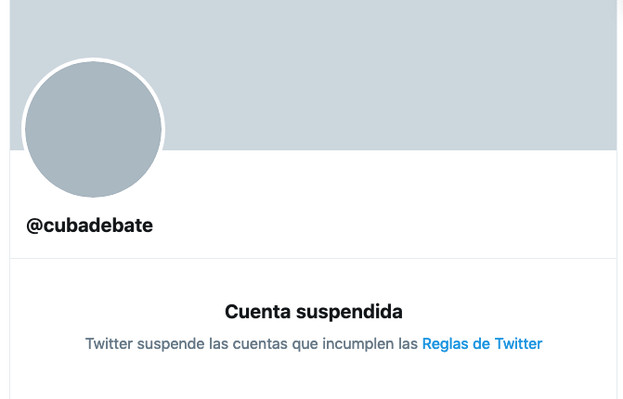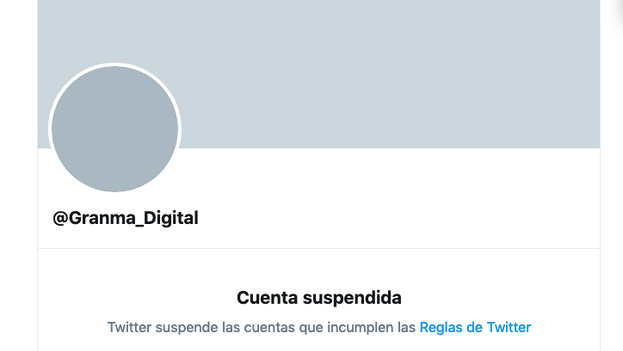
![]() 14ymedio, Havana, 12 September 2019 — The Union of Journalists of Cuba (Upec) called on Wednesday against “the limits to the freedom of expression of Cuban institutions and citizens.” The complaint responded to Twitter’s blocking of several official media and other institutional accounts which is limiting those who, in Upec’s opinion, and trying to “silence the leaders of the Revolution.”
14ymedio, Havana, 12 September 2019 — The Union of Journalists of Cuba (Upec) called on Wednesday against “the limits to the freedom of expression of Cuban institutions and citizens.” The complaint responded to Twitter’s blocking of several official media and other institutional accounts which is limiting those who, in Upec’s opinion, and trying to “silence the leaders of the Revolution.”
The Director of Global Communications of Twitter, Ian Plunkett, detailed to OnCuba through an email what “the actions” are that the company considers violations within the official accounts of several Cuban media as well as some journalists and officials, accounts which have been suspended.
One of the policies Twitter believes was not respected is its policy regarding manipulation, which was violated by “the artificial amplification of information through several accounts at the same time.”
Miguel Diaz-Canel’s speech had just begun this Wednesday in which he was announcing the exceptional measures that will be taken in response to the lack of fuel on the Island, when several of the government accounts learned that they had been blocked by Twitter. At first, those affected could access their timeline, but not the message options.
The accounts suspended “for violating the rules of Twitter” are those of Cubadebate (300,000 followers) and Granma (167,000), in addition to those of Mesa Redonda, Radio Rebelde, Dominio Cuba, Cubaperiodistas and Canal Caribe, by Leticia Martínez and Angélica Paredes, from the Díaz-Canel press team; Rosa Miriam Elizalde, first vice president of the Upec; and Enrique Moreno Gimeranez, a journalist from Granma.

The accounts of the Ministry of Communications and those of government officials were also closed, such as that of Yaira Jiménez Roig, Director of Communication and Images for the Ministry of Foreign Affairs; and that of the deputy and director of the National Center for Sex Education (Cenesex), Mariela Castro Espín, Raul Castro’s daughter.
“It seems a concerted operation of false allegations of abusive use and violation of platform policies. Surprising political bias, selectivity of affected users and opportunity (opportunism): when President Diaz Canel speaks,” wrote Elizalde.
Twitter reserves the right to suspend accounts that violate company rules, at the request of users who report them. Frequent reasons for suspension, as indicated by the company itself, include abusive messages or those that go against the rules, involve spam, security (prevention against possible hacking ). It is possible, and frequent, for a Twitter user to recover their account following the procedure indicated on the company’s website.
Although this type of event is not out of the ordinary in the use of the social network, the Upec considers that “what is new here is the massiveness of this act of cyber warfare, obviously planned, which seeks to limit the freedom of expression of Cuban institutions and citizens, and silence the leaders of the Revolution.”
“The Union of Cuban Journalists strongly denounces the disappearance of these spaces for the expression of ideas, in an act of mass censorship of journalists, editors and the media. We demand that the blocked accounts be restored immediately, which in no case have violated Twitter’s policies, while the platform flagrantly tramples on the rights of communicators, prevents them from engaging in their work and tries to muzzle a first-rate informational event in our country.”
The Upec one again demonstrates its militancy by defending the freedom of expression and the rights of communicators only when it comes to those linked to the ruling party. None of the independent Cuban media enjoys government recognition and, since the approval of the new computerization law, last July, this media is penalized for “disseminating, through public data transmission networks, information contrary to the social interest, the morale, good manners and the integrity of the people,” which, de facto, outlaws the digital media that, with the previous analog regulations, managed to overcome some of the restrictions.

The Upec has not raised its voice for the media blocked by the Cuban Government, including this newspaper, or by independent journalists detained in the exercise of their profession, a job that they cannot even perform since it is prohibited to do so outside the formal Institutions
The organization’s note also accuses the State Department of being involved in this situation. Last June, the Internet Working Group for Cuba, a group from the US proposed to provide more funds to open digital sites, generate “attractive content” on the network and provide scholarships. According to the Upec, these efforts are intended to “finance a cyber-militancy trained in harassment, lies and political assassination, which is not usually affected by these types of Twitter actions.”
The first references to social networks, such as Twitter and Facebook, in the official Cuban press, date from 2007 when these spaces were branded as “tools manufactured by the CIA.” At that time, a few independent activists and journalists made use of these networks and it took several years until the official voices began to engage on them.
_________________________
The 14ymedio team is committed to serious journalism that reflects the reality of deep Cuba. Thank you for joining us on this long road. We invite you to continue supporting us, but this time by becoming a member of 14ymedio. Together we can continue to transform journalism in Cuba.
